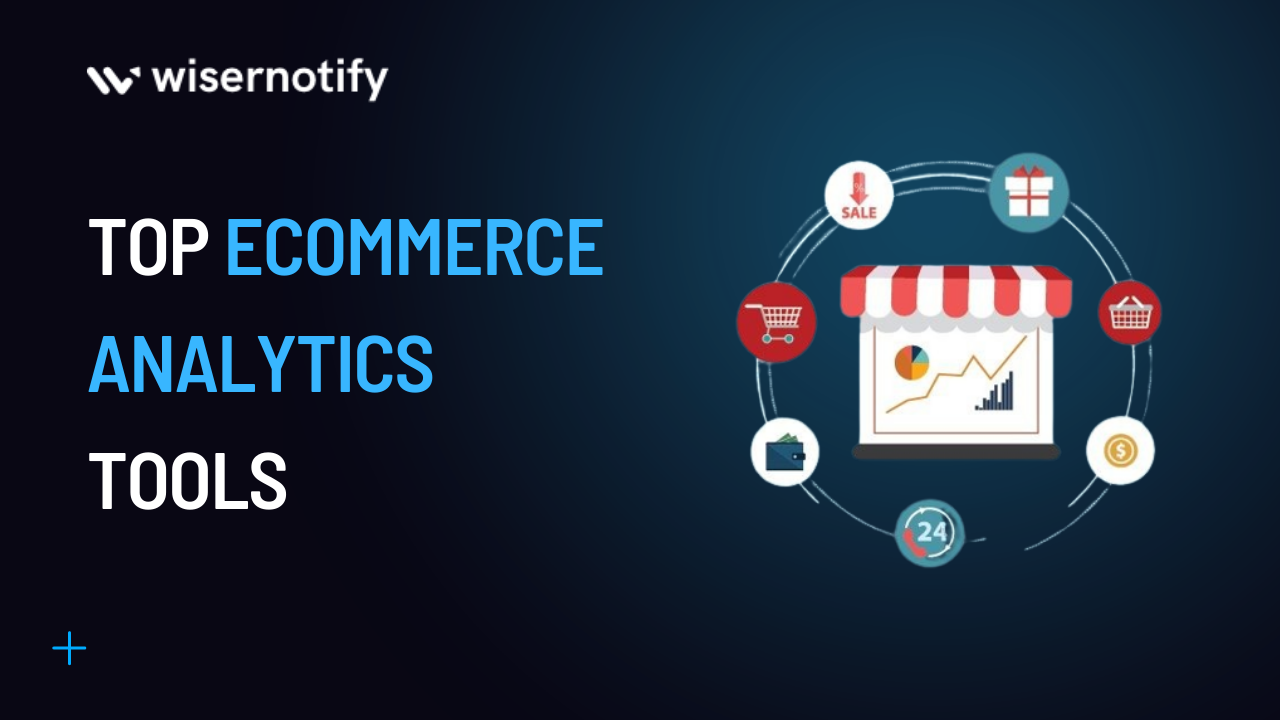Understanding your customers and market trends is crucial for success in eCommerce.
The right analytics tools can provide invaluable insights into customer behavior, sales patterns, and overall business performance.
In this blog, we explore 10 powerful eCommerce analytics tools that are game-changers in the industry.
These tools offer a comprehensive view of your online store’s performance, from tracking user engagement to analyzing sales data.
Whether you’re a small startup or a large enterprise, these analytics solutions are designed to help you make informed decisions, optimize your marketing strategies, and ultimately drive growth and profitability in your eCommerce venture.
Let’s dive in and discover how these tools can transform your business.
What is eCommerce analytics?
eCommerce analytics refers to the systematic collection, analysis, and interpretation of analytics data related to various aspects of an online business.
This data-driven approach enables e-commerce companies to make informed decisions and optimize their strategies to improve performance and customer satisfaction using e-commerce data.
With the immense growth of eCommerce, harnessing the power of data analytics has become increasingly crucial for businesses to stay competitive.
eCommerce analytics can cover many areas, including traffic, customer behavior, the sales funnel, and marketing efforts.
By analyzing the data from these different aspects, businesses can identify trends, patterns, and opportunities that could significantly impact their success.
For instance, data analysis of the sales funnel can reveal which products are selling well, which marketing campaigns drive the most conversions, or where customers drop off during checkout.
In the era of big data, digital analytics tools have become more sophisticated, allowing businesses to capture and analyze large volumes of data in real time.
These tools provide detailed reports and visualizations that help businesses monitor key performance indicators (KPIs), track their progress, and make data-driven decisions to achieve their objectives.
As a result, eCommerce analytics software has become an indispensable component of modern online eCommerce business operations.
Importance of eCommerce analytics for online businesses
In an increasingly competitive digital marketplace, the importance of eCommerce analytics for online businesses cannot be overstated.
For established eCommerce businesses and new entrants, understanding and utilizing analytics data is vital for staying ahead of the competition and driving growth.
First and foremost, eCommerce analytics software helps businesses monitor their performance across various channels and platforms.
This monitoring allows them to identify areas where they excel and need improvements.
By pinpointing these areas, eCommerce companies can allocate resources more efficiently and effectively.
Moreover, eCommerce analytics provides actionable insights that enable businesses to make well-informed decisions.
These insights can help them optimize their eCommerce metrics, marketing strategies, pricing models, and inventory management, resulting in increased sales and profitability.
For example, analyzing customer data can reveal trends and preferences that guide product development and promotional campaigns.
In addition, eCommerce analytics can help businesses identify potential issues before they escalate.
For instance, data analysis can detect unusual patterns or fluctuations indicating technical problems or fraudulent activities.
eCommerce companies can promptly protect their reputation, improve customer retention and maintain customer trust by addressing these issues.
eCommerce analytics is crucial for online businesses to stay competitive, improve performance, and make data-driven decisions that lead to long-term success.
Types of eCommerce Analytics Tools
This section will explore the various eCommerce analytics tools, categorized into four main groups: web analytics, customer behavior analytics, sales & revenue analytics, and marketing analytics tools.
These tools provide essential insights to help businesses optimize their online presence and drive growth.
Web analytics tools
Web analytics tools are fundamental to eCommerce analytics, providing insights into how visitors interact with your website.
A widespread tool like Google Analytics enables businesses to track and analyze key metrics such as website traffic, bounce rate, and conversion rate.
Web analytics tools monitor user behavior on a website and help identify trends and patterns that can inform design improvements and content optimization.
For example, understanding which pages have the highest bounce rate can help you address potential issues and enhance user experience.
Furthermore, these tools assist in identifying the sources of website traffic, such as organic search, paid advertisements, or social media.
This information allows businesses to evaluate the effectiveness of their marketing strategies and allocate resources more efficiently.
Web analytics tools are essential for gaining insights into your website’s performance and behavior.
They enable you to make data-driven decisions that improve user experience and increase conversion rate.
Must Read: 52 Best Conversion Rate Optimization Tools (Top Picks)
Customer behavior analytics tools
Customer behavior analytics tools focus on understanding the actions and preferences of your online visitors.
By analyzing customer behavior, businesses can gain valuable customer insights that help them tailor their offerings and marketing strategies to better meet the needs of their target audience.
These tools collect and analyze customer data from various touchpoints, including browsing patterns, product views, cart additions, and purchase history.
This information enables businesses to create detailed customer profiles, segment their audience, and personalize their marketing efforts.
Customer behavior analytics tools also help businesses map the customer journey – the series of interactions with a brand from the moment they land on the website to the point of conversion.
By examining the customer journey, businesses can identify potential pain points and areas of friction that may be hindering conversions.
Additionally, these tools can track individual customers’ behavior over time, revealing patterns that can be leveraged for targeted marketing campaigns and personalized product recommendations.
In essence, customer behavior analytics tools provide essential insights that empower businesses to better understand their audience, optimize their marketing strategies, and ultimately drive customer loyalty and revenue growth.
Sales and revenue analytics tools
Sales and revenue analytics tools play a critical role in monitoring and optimizing the financial performance of eCommerce businesses.
These tools enable businesses to track and analyze essential eCommerce metrics and key performance indicators (KPIs), such as revenue, profit margins, and growth rates, by evaluating sales data.
Financial analytics delves deeper, using this information to assess factors like profitability, cash flow, and return on investment (ROI).
This specialized analysis provides actionable insights to guide financial decision-making.
One crucial metric that sales and revenue analytics tools help businesses monitor is the average order value (AOV).
This metric reflects the average amount customers spend per transaction, providing insights into purchasing patterns and customer preferences.
By analyzing AOV, businesses can develop strategies to increase order values, such as cross-selling, upselling, or offering incentives for larger purchases.
Another crucial metric these tools can help track is the customer lifetime value (CLV).
This measure indicates the total revenue a business can expect from a single customer throughout its relationship with the brand.
Understanding CLV can help businesses determine their customers’ long-term value and guide their customer retention and acquisition strategies.
Sales and revenue analytics tools provide businesses with vital information on eCommerce KPIs and metrics that drive financial performance, enabling them to make informed decisions and optimize their strategies for sustained growth.
Marketing analytics tools
Marketing analytics tools are essential for tracking and measuring the effectiveness of your marketing efforts.
These tools enable businesses to assess the performance of various marketing campaigns, strategies, and channels, providing valuable insights that inform future decision-making.
Businesses can use a marketing analytics tool to identify the marketing initiatives that generate the highest return on investment (ROI) and focus their resources on the most effective strategies.
These tools can analyze email marketing performance, social media, content marketing, and paid advertising, including Google Ads.
Understanding the success of different marketing strategies helps businesses optimize their campaigns and allocate their marketing budget more effectively.
Additionally, these tools provide insights into customer acquisition costs, conversion rates, and customer retention, which are crucial for evaluating the overall success of marketing efforts.
Furthermore, marketing analytics tools can help businesses identify the most valuable marketing channels for reaching their target audience.
This information allows them to tailor their marketing efforts to the channels that deliver the best results, maximizing their marketing impact and driving growth.
Marketing analytics tools are critical in optimizing marketing strategies, maximizing ROI, and ensuring the long-term success of eCommerce businesses.
List of the Best 10 eCommerce Analytics Tools
1. Google Analytics
Google Analytics is a popular eCommerce analytics software that provides businesses valuable insights into website performance.
With its robust features and real-time data capabilities, Google Analytics enables businesses to monitor key metrics, analyze customer behavior, and optimize their online store.
This powerful tool helps eCommerce businesses make data-driven decisions that drive growth and enhance customer experience.
2. Mixpanel
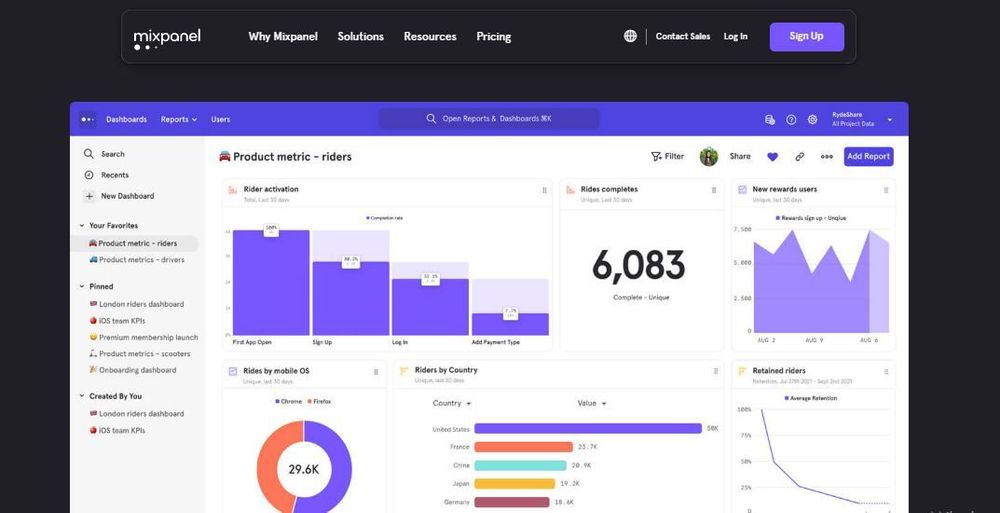
Mixpanel is considered one of the best analytics tools available for eCommerce businesses.
As a powerful eCommerce analytics tool, it tracks and analyzes customer behaviors to provide actionable insights.
By monitoring individual user interactions with your website, Mixpanel enables businesses to understand their customers better and optimize their marketing strategies, ultimately driving growth and improving customer experience.
3. Kissmetrics
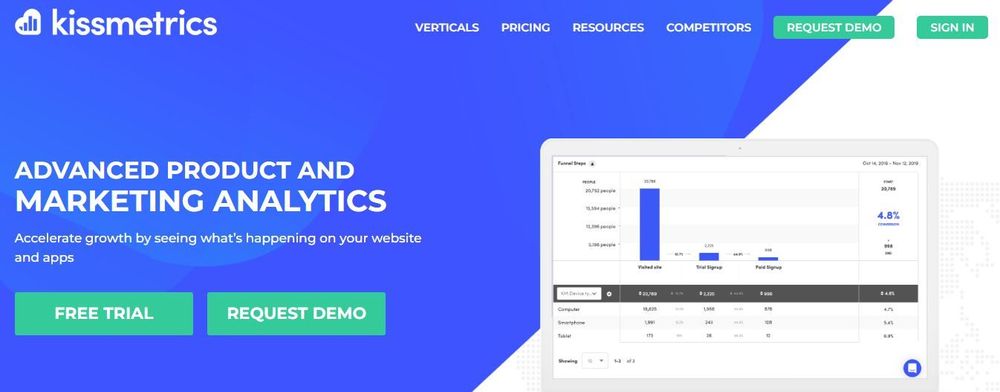
Kissmetrics is a comprehensive eCommerce analytics tool that offers valuable insights into customer behavior and engagement.
With a focus on tracking individual user behavior and customer lifetime value, Kissmetrics enables businesses to understand their audience better and optimize their marketing strategies.
Its robust features and detailed reporting capabilities make it a powerful addition to any eCommerce business looking to drive growth and improve customer satisfaction.
4. Woopra

Woopra is among the best eCommerce analytics tools for tracking and analyzing customer journeys in real-time.
Its intuitive interface and robust features make it suitable for both smaller eCommerce businesses and large enterprises.
With Woopra, businesses can gain insights into customer behavior, identify pain points, and optimize their strategies to improve user experience, leading to higher customer satisfaction and increased revenue.
5. Crazy Egg

Crazy Egg is one of the top eCommerce analytics tools. It helps businesses improve their website’s user experience and boost customer acquisition.
By providing insights into website traffic and visitor behavior, Crazy Egg enables businesses to identify areas of improvement and optimize their site layout, design, and content.
Its heatmap and scroll map features visually represent customer interactions, making it easier to understand and enhancing the overall user experience.
6. Hotjar

Hotjar is regarded as one of the best eCommerce analytics tools for understanding user behavior on your eCommerce store.
It combines heatmaps, session recordings, and surveys to collect valuable customer data, providing insights into how customers interact with your website.
By analyzing this data, businesses can identify areas of improvement, optimize their website layout, and create a more engaging and user-friendly shopping experience for their customers.
7. Lucky Orange
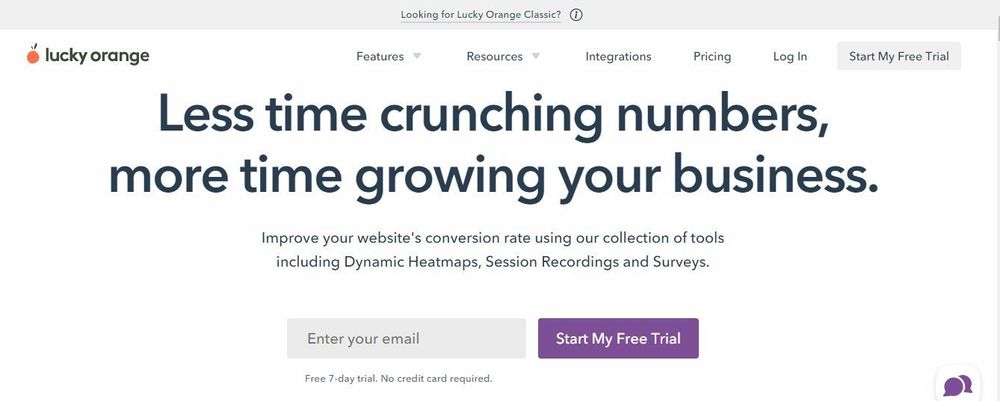
Lucky Orange is a powerful suite of eCommerce tools designed to help businesses optimize their eCommerce site and enhance the customer experience.
With features such as heatmaps, session recordings, and live chat, Lucky Orange enables businesses to understand visitor behavior and identify areas of improvement.
By leveraging these insights, businesses can make data-driven decisions to create a more engaging and user-friendly shopping experience, ultimately driving growth and success.
8. Adobe Analytics
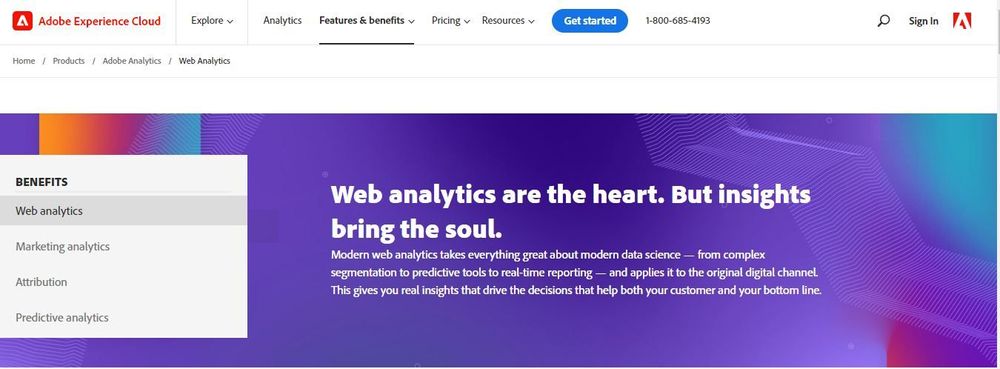
Adobe Analytics is a sophisticated eCommerce platform offering advanced data management capabilities and in-depth customer insights.
With its robust features and comprehensive reporting, Adobe Analytics enables businesses to better understand customer behavior, preferences, and engagement.
By leveraging these insights, businesses can make data-driven decisions to optimize their marketing strategies, website design, and overall customer experience, ultimately driving growth and success in the eCommerce space.
9. Piwik PRO

Piwik PRO is a powerful analytics tool that allows businesses to analyze their eCommerce data and gain valuable insights.
By tracking and analyzing data across different channels, Piwik PRO provides a comprehensive view of user behavior and preferences.
Businesses can use Piwik PRO to analyze traffic, conversion rates, and customer behavior data to optimize their marketing strategies and improve the overall customer experience.
With its advanced reporting and analysis capabilities, Piwik PRO is a valuable tool for eCommerce businesses looking to drive growth and success.
10. Segment
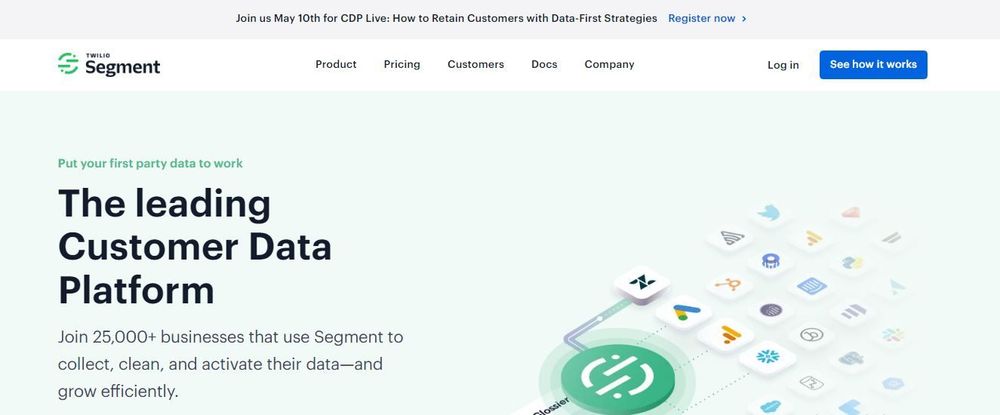
The Segment is an innovative eCommerce software enabling businesses to collect and manage customer data from their website and online store.
By integrating with various tools and platforms, Segment allows businesses to centralize their data and gain valuable insights into customer behavior and preferences.
This enables businesses to optimize their marketing strategies, improve the overall customer experience, and drive growth and success.
With its powerful data management capabilities, a Segment is a valuable tool for eCommerce businesses looking to harness the power of their customer data.
E-commerce Analytics Tools Benefits
Learn about customer behavior and preferences:
eCommerce analytics tools provide actionable customer-focused data that helps businesses learn about shopping behavior and preferences.
By analyzing data from every customer touchpoint, businesses can gain insights into how customers interact with their online store, identify their needs and preferences, and tailor their offerings and marketing strategies accordingly.
This deeper understanding leads to more personalized shopping experiences and increased customer satisfaction.
Find the areas of improvement in the sales process:
By analyzing the sales funnel, eCommerce analytics tools can help businesses identify potential drop-off points where customers abandon their purchases.
These insights allow businesses to make necessary adjustments and improvements in their sales process, such as optimizing sites and conversion rates.
Addressing these areas of improvement helps create a seamless shopping experience, resulting in higher conversions and increased revenue.
Optimize marketing strategies:
eCommerce analytics tools empower businesses to make data-driven decisions and optimize their marketing strategies.
With advanced analytics capabilities, these tools provide comprehensive reports and visualizations that help businesses monitor the performance of various marketing channels and campaigns.
Additionally, custom reports can be created to focus on specific metrics and KPIs, allowing businesses to fine-tune their marketing efforts, allocate resources more effectively, and maximize their return on investment.
Promotional campaign effectiveness measurement:
Measuring promotional campaign effectiveness is crucial for optimizing marketing efforts for e-commerce businesses.
eCommerce analytics tools help track conversion rates and other key metrics across different marketing channels to evaluate campaign success.
By leveraging a product analytics solution, businesses can identify the marketing initiatives that resonate with their target audience, allowing them to focus on the most effective strategies and channels, ultimately maximizing the impact of their promotional campaigns.
Enhance customer experience:
Utilizing eCommerce analytics tools can significantly enhance the customer experience by providing insights into various aspects of customer behavior.
By analyzing customer engagement, feedback, and interaction data, businesses can identify areas for improvement and make necessary adjustments.
Additionally, understanding the customer journey enables businesses to streamline the shopping process, making it more enjoyable and user-friendly.
These improvements ultimately result in a more satisfying customer experience, which fosters loyalty and drives long-term business success.
Which one is the best choice for you?
When choosing the best eCommerce analytics tool for your eCommerce business, you must consider your unique needs and goals for your eCommerce site.
The right analytics tools can provide valuable insights into customer behavior and preferences, enabling you to make data-driven decisions to optimize your marketing strategies, improve the overall customer experience, and improve customer retention.
One crucial factor to consider is the ability to target specific customer segments based on their behavior and preferences.
This allows you to tailor your marketing efforts and improve the relevance of your messaging to individual customers, increasing the likelihood of customer engagement and conversions.
Some of the best eCommerce analytics tools that offer these features include Kissmetrics, which enables businesses to track and analyze customer behavior across different channels and devices; Woopra, which provides a comprehensive view of customer journeys and engagement; and Crazy Egg, which uses heatmaps to improve the conversion rate and website usability and enhance customer acquisition.
By choosing the right eCommerce analytics tool for your business, you can gain valuable insights that can help you drive growth and success.
It’s important to carefully evaluate your options and choose the best eCommerce analytics tool that best aligns with your business needs and goals.
Whether a small eCommerce business or a large enterprise, the right analytics tool can help you stay ahead of the competition and achieve your business objectives.
Conclusion
In conclusion, the success of any eCommerce business is highly dependent on effectively analyzing and utilizing data to drive online sales and achieve shopping success.
By using sales data and leveraging the power of the best eCommerce analytics tools, businesses can gain valuable insights into customer behavior and preferences, identify areas of improvement in the sales process, optimize marketing strategies, measure the effectiveness of promotional campaigns, and ultimately enhance the overall customer experience in eCommerce store.
Choosing the right eCommerce and marketing analytics tool is crucial for obtaining the most relevant data and insights that will enable informed decision-making and facilitate the growth of your online business.
With many options available, it is essential to carefully evaluate each tool’s features and capabilities to ensure it aligns with your specific needs and objectives.
In the ever-evolving landscape of online retail, staying competitive requires a proactive approach to leveraging data and analytics.
By harnessing the power of their eCommerce platform and analytics, businesses can stay ahead of the curve, continuously improve their offerings, and ultimately achieve sustainable growth and success in the online marketplace.
